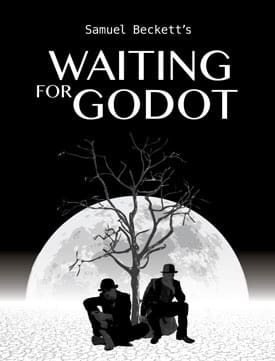The fact that Waiting for Godot is classified as an absurdism play already tells us that nothing is truly straightforward in it. It is in the very nature of the play to make us, as the audience, begin questioning things and create our own opinions and interpretations.
It is believed that the intention of this text was to cause the audience or the readers to reflect upon our own lives and relate it to this piece when we attempt to analyze it.
During our personal analysis of the text and of life, certain concepts pop up more than others. These are the themes that Samuel Beckett hoped to send as a message to us, namely, the deterioration of the human body, the uselessness of waiting, and, as is expected of absurdist plays, existentialism.
Another very noticeable theme in the play is the lack or loss of communication. We observe this with the way that the characters speak to each other, in a nonsensical sort of way with an odd sense of rhythm.
There are plenty of times in the play when the conversation seems to make no sense to us, and we start to see that these characters are talking so much, without actually saying much at all.
And perhaps, the most illogical part of all was Lucky’s monologue, in which he never truly finishes a coherent thought, let alone a full sentence. However, we must not ignore that there have been moments when the communication between the men were successful, as the message of what they were saying did get across to us.
The point of Beckett making the basics of language seem so complicated, and the way that they speak and their logic make no sense at all, was for us to reflect on our ways of communicating. Are we also talking without truly saying anything? Is what we say as nonsensical and meaningless as their dialogue?
Humans communicate with each other because we have information that we’d like to pass on, but what if we had nothing to share? That would make us seem empty as there is nothing particularly special or useful about us, and this is the case with the characters of the play. None of them have a set personality or anything that makes them distinct.
We do not know anything about them, who they are, where they are from, and it seems, that neither do they. The characters, especially Albert Vladimir and Adam Estragon, always forget things, and their memory issues not only create a dependency between the two of them, but also makes them unable to discuss their past, their background, nor the experiences that have shaped them into who they are.
The fact that there is nothing distinct about them also makes it harder for us, as the audience, to relate to any of the characters, thus forcing us to look at them externally and analyze them from a distance.
Another thing to note about the two main characters is their lack of identity. While we know them as Vladimir and Estragon because of the script, we never actually hear these names in the play. Instead, we hear their nicknames, “Didi” and “Gogo”, and only once do we hear each of their first names. These people just merely exist, there is nothing special about them, and they do not grow and develop in any way.
This adds to their frustration and their desperation for something that they’ve hoped for to come along and give meaning to their lives. In this case, we can assume that this ‘something’ is the character named Godot.
But the fact that the thing that they hoped for never came around leads me to another theme that was also important in Waiting for Godot, the hostility of the universe we are in. At the beginning of the play, we learn that the setting of the play is physically hostile and violent when Estragon admits to having been beaten up, but their world is also cruel because the one thing that they wanted, the thing that they sacrificed their time for (not that they don’t have plenty of it to waste anyway), is one of the many things that they will not receive.
Many people have questioned the name of one of the characters, Lucky, who is a slave to the landowner Pozzo. If he is a slave, then how is he lucky? Well, his world revolves around his servitude to his master, making him unaware of the hopelessness and desperation of the world around him.
In a way, we can be seen as the character Lucky in real life. We are believed to be blissfully ignorant to the meaninglessness of our lives, so does that not also make us slaves to some sort of superior being?
Even though Lucky is unaware of his situation, the others are not. Another theme that leads to existentialism is death. The world around them is so hostile and cold, that Vladimir and Estragon consider hanging themselves on a tree to pass time, suggesting that struggling for air is something somewhat enjoyable in their unfriendly environment that is filled with fear and uncertainty.
This causes us to look at our own world in a new light. We begin to consider that perhaps our world is also cold and hostile, because we are also uncertain of our futures and what happens after death, and many of us fear it too.
The way that the characters speak forces us to look at the way we communicate with each other and reflect on that too, as well as ponder our true identities. Therefore, with all things considered, I would say that Beckett was successful in creating a play that will force us to reflect upon our own lives, willingly or not, and analyze it in hopes of understanding and interpreting the text titled Waiting for Godot.

